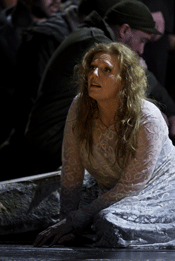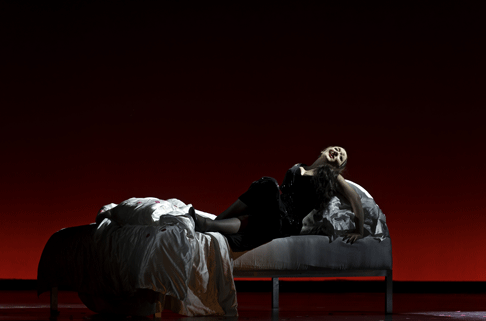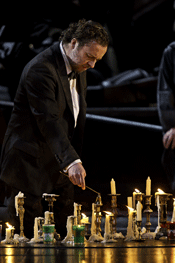Perhaps Tim Albery’s inspiration came from the prize-singing contest. Dominating the stage in the First Act is a fake Royal Opera House proscenium, complete with fake velvet curtains and gold trimmings. It’s absolutely stunning. But beware! The fact remains, Tannhäuser is not Adriana Lecouvreur.
For Wagner, Tannhäuser is torn between extremes. Venusberg represents orgiastic excess and abandonment, Wartburg ascetic self denial. Wartburg wins. Venusberg doesn’t. If Albery thinks Tannhäuser is a metaphor for opera and for the Royal Opera House in particular, maybe he should get out more and see the real world. Prize song contests aren’t just about “singing”, as we know from Die Meistersinger von Nürnberg, and it is even closer to medieval morality tales. For Wagner (who personally liked velvet and excess) what is at issue is a new sensibility built on rigorous conceptual thinking. Wagner’s deliberately distancing himself from Meyerbeer and what he thought of as feelgood, but brainless, glitz.
Hence, the ballet that portrays Venusberg. It’s a pointed dig against the kind of entertainment Wagner rejected, and at the kind of audiences who used to flock to see ballerinas’ legs, ignoring the music and drama. Here the ballet is presented completely devoid of irony. Once I saw a production where the ballet was a bondage orgy, the dancers inhuman beasts. Horrifying yet hypnotic, which is why Tannhäuser was enslaved. If Venusberg was as safe and wholesome and dull as this ballet, he would have long since died of boredom.
 Eva-Marie Westbroek as Elisabeth
Eva-Marie Westbroek as Elisabeth
Albery’s Wartburg is post apocalyptic greyness. The Royal Opera House arch lies broken, twisted like rubble in the background. Visually, though this adds a vertical element to the horizontal flatness. The barrenness is valid, since Wartburg’s in crisis situation. If Venusberg’s no fun, Wartburg should be even less so. Physical movement in the First Act is slow to the point of being comatose. At first I thought this was to allow for Johann Botha’s disability, which would be laudable, but then remembered that excessively slow movement is a Tim Albery trademark. In Albery’s Der fliegende Holländer , Bryn Terfel spent much of the time appearing to pull a long rope suspended diagonally across the stage. (An echo of that rope appears in this Tannhäuser too.) Grunge aesthetic is an Albery thing, whatever the opera or the singer, and sometimes it works. Obviously directors have an individual language, as all artists do, but grimness for its own sake can become tedious if it holds up dramatic flow.
Tannhäuser is not a romantic hero. He left Wartburg in a pique and gave in whole-heartedly to Venusberg’s excesses. Thus Johann Botha’s portrayal is psychologically accurate. Wagner’s whole point is that the character is sated, almost destroyed by what he’s experienced, yet still has a spark of goodness that makes him worth saving. That’s why Elisabeth cares about him. Why redeem someone who doesn’t need help? Botha’s characterization was much more subtle and true to the role and to the opera than might meet the eye. On the ear, too, he was very good, totally justifying the casting, even if his voice flagged in the final Act. Much better that Botha sings Tannhäuser with a sense of his inner complexes. Conflict is central to this opera, and Botha’s singing expresses depth and complexity. It’s a difficult role, and less gratifying because the big showpiece song isn’t his, but Botha shows that he’s a hero in his own way. Perhaps Wagner knew that the Meyerbeer crowd would never understand.
 Michaela Schuster as Venus
Michaela Schuster as Venus
Tannhäuser might see Elisabeth as the Virgin Mary, but Elisabeth is a real woman with intense passions. Eva-Maria Westbroek’s singing brings out the wildness, even the sexuality in the role. Westbroek’s forte is bringing personality to the parts she sings, and here she turns an almost stereotype into a fully-formed human being,. A lesser singer would be trapped by the restrictions created by this costume and direction. Westbroek overcomes these obstacles by her innate artistry.
Three different people in the audience mentioned that Christian Gerhaher sings like a Lieder singer. This has become such a cliché that maybe it’s time to think what that actually means. Gerhaher got mauled by Fischer-Dieskau fans many years ago, so conversely I’ve listened to him with much greater sympathy than otherwise. I’ve got most of his records and been to most of his UK concerts. He’s an excellent singer, but the smoothness of his line is best suited to roles which reach beyond the fundamental grittiness of Lieder. He’s a perfect Wolfram von Eschenbach. Here his clean timbre creates Wolfram as an idealized symbolic figurehead, not quite of this world even though he was a historic figure. That, for me, is why Gerhaher’s Wolfram was sublime. The character itself is less important than what it represents. Wolfram is the embodiment of “die heilige deutsche Kunst”, something greater than mere mortals.
 Christian Gerhaher as Wolfram von Eschinbach
Christian Gerhaher as Wolfram von Eschinbach
Semyon Bychkov conducted the Royal Opera House Orchestra. Very beautiful, emphasizing the lyricism in the score. The interludes uninterrupted by staging were excellent. Given Albery’s view that Tannhäuser operates at a critical post-trauma turning point, one might have hoped that Bychkov might have injected some crackling tension into the music. It’s not a comfortable opera. Wagner declares against Venus, after all.
At the end, another typical Albery touch. In his Der fliegende Holländer, the Dutchman’s haunting portrait was replaced by a toy boat. That’s acceptable, as an indication of Senta’s fantasist immaturity. In this Tannhäuser there’s no papal staff to burst into leaf. Instead a small boy, seated on the same chair Tannhäuser sat in, playing with what looks like a neon toy Xmas tree. Even if it’s supposed to be symbolic, it’s absurd. Reductionism can work extremely well in opera, but badly done, it turns to trivia.
Michaela Schuster, who sang the Princess in Adriana Lecouvreur, recently sang Venus. A sold cast all round: good support from Timothy Robinson, Steven Ebel, Clive Bayley and Jeremy White.
This production of Wagner’s Tannhäuser runs at the Royal Opera House, London until January 2nd 2011. For more information, please see the Royal Opera House site.
Anne Ozorio
![Johann Botha as Tannhäuser [Photo by Clive Barda courtesy of the Royal Opera House]](http://www.operatoday.com/TANN-101206_1613-BOTHA-AS-T.gif)


